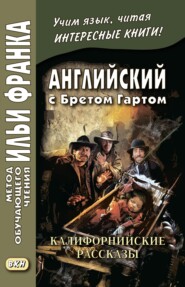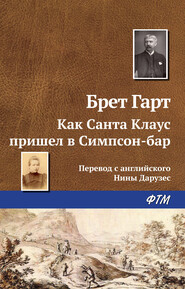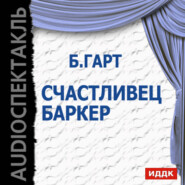По всем вопросам обращайтесь на: info@litportal.ru
(©) 2003-2024.
✖
Gabriel Conroy
Автор
Год написания книги
2017
Настройки чтения
Размер шрифта
Высота строк
Поля
"Here seems to be a road," said a voice quite audibly.
"All right, then," returned another, "it's the 'cut-off. We'll save an hour, sure."
A third voice here struck in potentially, "Keep the stage road. If Joe Hall gets wind of what's up, he'll run his man down to Sacramento for safe keeping. If he does he'll take this road – it's the only one – sabe? – we can't miss him!"
Jack Hamlin leaned forward breathlessly in his seat.
"But it's an hour longer this way," growled the second voice. "The boys will wait," responded the previous speaker. There was a laugh, a jingling of spurs, and the invisible procession moved slowly forward in the darkness.
Mr. Hamlin did not stir a muscle until the voices failed before him in the distance. Then he cast a quick glance at the child; she still slept quietly, undisturbed by the halt or those ominous voices which had brought so sudden a colour into her companion's cheek and so baleful a light in his dark eyes. Yet for a moment Mr. Hamlin hesitated. To go forward to Wingdam now would necessitate his following cautiously in the rear of the Lynchers, and so prevent his giving a timely alarm. To strike across to One Horse Gulch by the "cut-off" would lose him the chance of meeting the Sheriff and his prisoner, had they been forewarned and were escaping in time. But for the impediment of the unconscious little figure beside him, he would have risked a dash through the party ahead of him. But that was not to be thought of now. He must follow them to Wingdam, leave the child, and trust to luck to reach One Horse Gulch before them. If they delayed a moment at Wingdam it could be done. A feeling of yearning tenderness and pity succeeded the slight impatience with which he had a moment before regarded his encumbering charge. He held her in his arms, scarcely daring to breathe lest he should waken her – hoping that she might sleep until they reached Wingdam, and that leaving her with his faithful henchman "Pete," he might get away before she was aroused to embarrassing inquiry. Mr. Hamlin had a man's dread of scenes with even so small a specimen of the sex, and for once in his life he felt doubtful of his own readiness, and feared lest in his excitement he might reveal the imminent danger of her brother. Perhaps he was never before so conscious of that danger; perhaps he was never before so interested in the life of any one. He began to see things with Olly's eyes – to look upon events with reference to her feelings rather than his own; if she had sobbed and cried this sympathetic rascal really believed that he would have cried too. Such was the unconscious and sincere flattery of admiration. He was relieved, when with the first streaks of dawn, his mare wearily clattered over the scattered river pebbles and "tailings" that paved the outskirts of Wingdam. He was still more relieved when the Three Voices of the Night, now faintly visible as three armed horsemen, drew up before the verandah of the Wingdam Hotel, dismounted, and passed into the bar-room. And he was perfectly content, when a moment later he lifted the still sleeping Olly in his arms and bore her swiftly yet cautiously to his room. To awaken the sleeping Pete on the floor above, and drag him half-dressed and bewildered into the presence of the unconscious child, as she lay on Jack Hamlin's own bed, half buried in a heap of shawls and rugs, was only the work of another moment.
"Why, Mars Jack! Bress de Lord – it's a chile!" said Pete, recoiling in sacred awe and astonishment.
"Hold your jaw!" said Jack, in a fierce whisper, "you'll waken her! Listen to me, you chattering idiot. Don't waken her, if you want to keep the bones in your creaking old skeleton whole enough for the doctors to buy. Let her sleep as long as she can. If she wakes up and asks after me, tell her I'm gone for her brother. Do you hear? Give her anything she asks for – except – the truth! What are you doing, you old fool?"
Pete was carefully removing the mountain of shawls and blankets that Jack had piled upon Olly. "'Fore God, Mars Jack – you's smuddering dat chile!" was his only response. Nevertheless Jack was satisfied with a certain vague tenderness in his manipulation, and said curtly, "Get me a horse!"
"It ain't to be did, Mars Jack; de stables is all gone – cleaned! Dey's a rush over to One Horse Gulch, all day!"
"There are three horses at the door," said Jack, with wicked significance.
"For de love of God, Mars Jack, don't ye do dat!" ejaculated Pete, in unfeigned and tremulous alarm. "Dey don't take dem kind o' jokes yer worth a cent – dey'd be doin' somefin' awful to ye, sah – shuah's yer born!"
But Jack, with the child lying there peaceably in his own bed, and the Three Voices growing husky in the bar-room below, regained all his old audacity. "I haven't made up my mind," continued Jack, coolly, "which of the three I'll take, but you'll find out from the owner when I do! Tell him that Mr. Jack Hamlin left his compliments and a mare and buggy for him. You can say that if he keeps the mare from breaking and gives her her head down hill, she can do her mile inside of 2.45. Hush! not a word! Bye-bye." He turned, lifted the shawl from the fresh cheek of the sleeping Olly, kissed her, and shaking his fist at Pete, vanished.
For a few moments the negro listened breathlessly. And then there came the sharp, quick clatter of hoofs from the rocky road below, and he sank dejectedly at the foot of the bed. "He's gone – done it! Lord save us! but it's a hangin' matter yer!" And even as he spoke Mr. Jack Hamlin, mounted on the fleet mustang that had been ridden by the Potential Voice, with his audacious face against the red sunrise and his right shoulder squarely advanced, was butting away the morning mists that rolled slowly along the river road to One Horse Gulch.
CHAPTER VI.
MR. DUMPHY IS PERPLEXED BY A MOVEMENT IN REAL ESTATE
Mr. Dumphy's confidence in himself was so greatly restored that several business enterprises of great pith and moment, whose currents for the past few days had been turned awry, and so "lost the name of action," were taken up by him with great vigour and corresponding joy to the humbler business associates who had asked him just to lend his name to that project, and make "a big thing of it." He had just given his royal sanction and a cheque to an Association for the Encouragement of Immigration, by the distribution through the sister States of one million seductive pamphlets, setting forth the various resources and advantages of California for the farmer, and proving that one hundred and fifty dollars spent for a passage thither was equal to the price of a farm; he had also assisted in sending the eloquent Mr. Blowhard and the persuasive Mr. Windygust to present these facts orally to the benighted dwellers of the East, and had secured the services of two eminent Californian statisticians to demonstrate the fact, that more people were killed by lightning and frozen to death in the streets of New York in a single year than were ever killed by railroad accidents or human violence in California during the past three centuries; he had that day conceived the "truly magnificent plan" of bringing the waters of Lake Tahoe to San Francisco by ditches, thereby enabling the citizens to keep the turf in their door-yards green through the summer. He had started two banks, a stage line, and a watering place, whose climate and springs were declared healthful by edict, and were aggressively advertised; and he had just projected a small suburban town that should bear his name. He had returned from this place in high spirits with a company of friends in the morning after this interview with Poinsett. There was certainly no trace of the depression of that day in his manner.
It was a foggy morning, following a clear, still night – an atmospheric condition not unusual at that season of the year to attract Mr. Dumphy's attention, yet he was conscious on reaching his office of an undue oppressiveness in the air that indisposed him to exertion, and caused him to remove his coat and cravat. Then he fell to work upon his morning's mail, and speedily forgot the weather. There was a letter from Mrs. Sepulvida, disclosing the fact that, owing to the sudden and unaccountable drying up of the springs on the lower plains, large numbers of her cattle had died of thirst and were still perishing. This was of serious import to Mr. Dumphy, who had advanced money on this perishable stock, and he instantly made a memorandum to check this sudden freak of Nature, which he at once attributed to feminine carelessness of management. Further on Mrs. Sepulvida inquired particularly as to the condition of the Conroy mine, and displayed a disposition characteristic of her sex, to realise at once on her investment. Her letter ended thus: "But I shall probably see you in San Francisco. Pepe says that this morning the markings on the beach showed the rise of a tide or wave during the night higher than any ever known since one thousand eight hundred. I do not feel safe so near the beach, and shall rebuild in the spring." Mr. Dumphy smiled grimly to himself. He had at one time envied Poinsett. But here was the woman he was engaged to marry, careless, improvident, with a vast estate, and on the eve of financial disaster through her carelessness, and yet actually about to take a journey of two hundred miles because of some foolish, womanish whim or superstition. It would be a fine thing if this man, to whom good fortune fell without any effort on his part – this easy, elegant supercilious Arthur Poinsett, who was even indifferent to that good fortune, should find himself tricked and deceived! should have to apply to him, Dumphy, for advice and assistance! And this, too, after his own advice and assistance regarding the claims of Colonel Starbottle's client had been futile. The revenge would be complete. Mr. Dumphy rubbed his hands in prospective satisfaction.
When, a few moments later, Colonel Starbottle's card was put into his hand Mr. Dumphy's satisfaction was complete. This was the day that the gallant Colonel was to call for an answer; it was evident that Arthur had not seen him, nor had he made the discovery of Starbottle's unknown client. The opportunity of vanquishing this man without the aid or even knowledge of Poinsett was now before him. By way of preparing himself for the encounter, as well as punishing the Colonel, he purposely delayed the interview, and for full five minutes kept his visitor cooling his heels in the outer office.
He was seated at his desk, ostentatiously preoccupied, when Colonel Starbottle was at last admitted. He did not raise his head when the door opened, nor in fact until the Colonel, stepping lightly forward, walked to Dumphy's side, and deliberately unhooking his cane from its accustomed rest on his arm, laid it, pronouncedly, on the desk before him. The Colonel's face was empurpled, the Colonel's chest was efflorescent and bursting, the Colonel had the general effect of being about to boil over the top button of his coat, but his manner was jauntily and daintily precise.
"One moment! – a single moment, sir!" he said, with husky politeness. "Before proceeding to business – er – we will devote a single moment to the necessary explanations of – er – er – a gentleman. The kyard now lying before you, sir, was handed ten minutes ago to one of your subordinates. I wish to inquire, sir, if it was then delivered to you?"
"Yes," said Mr. Dumphy, impatiently.
Colonel Starbottle leaned over Mr. Dumphy's desk and coolly rung his bell. Mr. Dumphy's clerk instantly appeared at the door. "I wish – " said the Colonel, addressing himself to the astounded employé as he stood loftily over Mr. Dumphy's chair – "I have – er – in fact sent for you, to withdraw the offensive epithets I addressed to you, and the threats – of er – of er – personal violence! The offence – is not, yours – but – er – rests with your employer, for whose apology I am – er – now waiting. Nevertheless I am ready, sir, to hold myself at your service – that is – er – of course – after my responsibility – er – with your master – er – ceases!"
Mr. Dumphy, who in the presence of Colonel Starbottle felt his former awkwardness return, signed with a forced smile to his embarrassed clerk to withdraw, and said hastily, but with an assumption of easy familiarity, "Sorry, Colonel, sorry, but I was very busy, and am now. No offence. All a mistake, you know! business man and business hours," and Mr. Dumphy leaned back in his chair, and emitted his rare cachinnatory bark.
"Glad to hear it, sir, I accept your apology," said the Colonel, recovering his good humour and his profanity together, "hang me, if I didn't think it was another affair like that I had with old Maje Tolliver, of Georgia. Called on him in Washington in '48 during session. Boy took up my kyard. Waited ten minutes, no reply! Then sent friend, poor Jeff Boomerang, dead now, killed in New Orleans by Ben Pastor – with challenge. Hang me, sir, after the second shot, Maje sends for me, lying thar with hole in both lungs, gasping for breath. 'It's all a blunder, Star,' he says, 'boy never brought kyard. Horsewhip the nigger for me, Star, for I reckon I won't live to do it,' and died like a gentleman, blank me!"
"What have you got to propose?" said Mr. Dumphy, hastily, seeing an opportunity to stop the flow of the Colonel's recollections.
"According to my memory, at our last interview over the social glass in your own house, I think something was said of a proposition coming from you. That is – er," continued the Colonel, loftily, "I hold myself responsible for the mistake, if any."
It had been Mr. Dumphy's first intention to assume the roughly offensive; to curtly inform Colonel Starbottle of the flight of his confederate, and dare him to do his worst. But for certain vague reasons he changed his plan of tactics. He drew his chair closer to the Colonel, and clapping his hand familiarly on his shoulder, began —
"You're a man of the world, Starbottle, so am I. Sabe? You're a gentleman – so am I," he continued, hastily. "But I'm a business man, and you're not. Sabe? Let's understand each other. No offence, you know, but in the way of business. This woman, claiming to be my wife, don't exist – it's all right, you know, I understand. I don't blame you, but you've been deceived, and all that sort of thing. I've got the proofs. Now as a man of the world and a gentleman and a business man, when I say the game's up! you'll understand me. Look at that – there!" He thrust into Starbottle's hand the telegram of the preceding day, "There! the man's hung by this time – lynched! The woman's gone!"
Colonel Starbottle read the telegram without any perceptible dismay or astonishment.
"Conroy! Conroy! – don't know the man. There was a McConroy, of St. Jo, but I don't think it's the same. No, sir! This ain't like him, sir! Don't seem to be a duel, unless he'd posted the man to kill on sight – murder's an ugly word to use to gentlemen. D – n me, sir, I don't know but he could hold the man responsible who sent that despatch. It's offensive, sir – very!"
"And you don't know Mrs. Conroy?" continued Mr. Dumphy, fixing his eyes on Colonel Starbottle's face.
"Mrs. Conroy! The wife of the superintendent – one of the most beautiful women! Good Ged, sir, I do! And I'm dev'lish sorry for her. But what's this got to do with our affair? Oh! I see, Ged!" – the Colonel suddenly chuckled, drew out his handkerchief, and waved it in the air with deprecatory gallantry, "gossip, sir, all gossip. People will talk! A fine woman! Blank me, if she was inclined to show some attention to Colonel Starbottle – Ged, sir, it was no more than other women have. You comprehend, Dumphy? Ged, sir, so the story's got round, eh? – husband's jealous – killed wrong man! Folks think she's run off with Colonel Starbottle, ha! ha! No, sir," he continued, suddenly dropping into an attitude of dignified severity. "You can say that Colonel Starbottle branded the story as a lie, sir! That whatever might have been the foolish indiscretion of a susceptible sex, Colonel Starbottle will defend the reputation of that lady, sir, with his life – with his life!"
Absurd and ridiculous as this sudden diversion of Colonel Starbottle from the point at issue had become, Dumphy could not doubt his sincerity, nor the now self-evident fact that Mrs. Conroy was not his visitor's mysterious client! Mr. Dumphy felt that his suddenly built up theory was demolished and his hope with it. He was still at the mercy of this conceited braggart and the invisible power behind him – whoever or whatever it might be. Mr. Dumphy was not inclined to superstition, but he began to experience a strange awe of his unknown persecutor, and resolved at any risk to discover who it was. Could it be really his wife? – had not the supercilious Poinsett been himself tricked – or was he not now trying to trick him, Dumphy? Couldn't Starbottle be bribed to expose at least the name of his client? He would try it.
"I said just now you had been deceived in this woman who represents herself to be my wife. I find I have been mistaken in the person, who I believe imposed upon you, and it is possible that I may be otherwise wrong. My wife may be alive. I am willing to admit it. Bring her here to-morrow and I will accept it as a fact."
"You forget that she refuses to see you again," said Colonel Starbottle, "until she has established her claim by process of law."
"That's so! that's all right, old fellow; we understand each other. Now, suppose that we business men – as a business maxim, you know – always prefer to deal with principals. Now suppose we even go so far as to do that and yet pay an agent's commission, perhaps – you understand me – even a bonus. Good! That's business! You understand that as a gentleman and a man of the world. Now, I say, bring me your principal – fetch along that woman, and I'll make it all right with you. Stop! I know what you're going to say; you're bound by honour and all that – I understand your position as a gentleman, and respect it. Then let me know where I can find her! Understand – you sha'n't be compromised as bringing about the interview in any way. I'll see that you're protected in your commissions from your client; and for my part – if a cheque for five thousand dollars will satisfy you of my desire to do the right thing in this matter, it's at your service."
The Colonel rose to his feet and applied himself apparently to the single and silent inflation of his chest, for the space of a minute. When the upper buttons of his coat seemed to be on the point of flying off with a report, he suddenly extended his hand and grasped Dumphy's with fervour. "Permit me," he said, in a voice husky with emotion, "to congratulate myself on dealing with a gentleman and a man of honour. Your sentiments, sir, I don't care if I do say it, do you credit! I am proud, sir," continued the Colonel, warmly, "to have made your acquaintance! But I regret to say, sir, that I cannot give you the information you require. I do not myself know the name or address of my client."
The look of half-contemptuous satisfaction which had irradiated Dumphy's face at the beginning of this speech, changed to one of angry suspicion at its close. "That's a d – d queer oversight of yours," he ejaculated, with an expression as nearly insulting as he dared to make it. Colonel Starbottle did not apparently notice the manner of his speech, but drawing his chair close beside Dumphy, he laid his hand upon his arm.
"Your confidence as a man of honour and a gentleman," he began, "demands equal confidence and frankness on my part, and Culp. Starbottle of Virginia is not the, man to withhold it! When I state that I do not know the name and address of my client, I believe, sir, there is no one now living, who will – er – er – require or – er – deem it necessary for me to repeat the assertion! Certainly not, sir," added the Colonel, lightly waving his hand, "the gentleman who has just honoured me with his confidence and invited mine – I thank you, sir," he continued, as Mr. Dumphy made a hasty motion of assent, "and will go on."
"It is not necessary for me to name the party who first put me in possession of the facts. You will take my word as a gentleman – er – that it is some one unknown to you, of unimportant position, though of strict respectability, and one who acted only as the agent of my real client. When the case was handed over to me there was also put into my possession a sealed envelope containing the name of my client and principal witness. My injunctions were not to open it until all negotiations had failed and it was necessary to institute legal proceedings. That envelope I have here. You perceive it is unopened!"
Mr. Dumphy unconsciously reached out his hand. With a gesture of polite deprecation Colonel Starbottle evaded it, and placing the letter on the table before him, continued, "It is unnecessary to say that – er – there being in my judgment no immediate necessity for the beginning of a suit – the injunctions still restrain me, and I shall not open the letter. If, however, I accidentally mislay it on this table and it is returned to me to-morrow, sealed as before, I believe, sir, as a gentleman and a man of honour I violate no pledge."
"I see," said Mr. Dumphy, with a short laugh.
"Excuse me, if I venture to require another condition, merely as a form among men of honour. Write as I dictate." Mr. Dumphy took up a pen. Colonel Starbottle placed one hand on his honourable breast and began slowly and meditatively to pace the length of the room with the air of a second measuring the distance for his principal. "Are you ready?"
"Go on," said Dumphy, impatiently.
"I hereby pledge myself – er – er – that in the event of any disclosure by me – er – of confidential communications from Colonel Starbottle to me, I shall hold myself ready to afford him the usual honourable satisfaction – er – common among gentlemen, at such times or places, and with such weapons as he may choose, without further formality of challenge, and that – er – er – failing in that I do thereby proclaim myself, without posting, a liar, poltroon, and dastard."
In the full pre-occupation of his dignified composition, and possibly from an inability to look down over the increased exaggeration of his swelling breast, Colonel Starbottle did not observe the contemptuous smile which curled the lip of his amanuensis. Howbeit Mr. Dumphy signed the document and handed it to him. Colonel Starbottle put it in his pocket. Nevertheless he lingered by Mr. Dumphy's side.
"The – er – er – cheque," said the Colonel, with a slight cough, "had better be to your order, endorsed by you – to spare any criticism hereafter."
Mr. Dumphy hesitated a moment. He would have preferred as a matter of business to have first known the contents of the envelope, but with a slight smile he dashed off the cheque and handed it to the Colonel. "If – er – it would not be too much trouble," said the Colonel, jauntily, "for the same reason just mentioned, would you give that – er – piece of paper to one of your clerks to draw the money for me?"
Mr. Dumphy impatiently, with his eyes on the envelope, rang his bell and handed the cheque to the clerk, while Colonel Starbottle, with an air of abstraction, walked discreetly to the window.

















